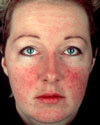
Phone: 1-888-NO-BLUSH
Email: rosaceas@aol.com
The National Rosacea Society is a 501(c)(3) nonprofit organization whose mission is to improve the lives of people with rosacea by raising awareness, providing public health information and supporting medical research on this widespread but little-known disorder. The information the Society provides should not be considered medical advice, nor is it intended to replace consultation with a qualified physician. The Society does not evaluate, endorse or recommend any particular medications, products, equipment or treatments. Rosacea may vary substantially from one patient to another, and treatment must be tailored by a physician for each individual case. For more information, visit About Us.
 osacea (pronounced roh-ZAY-sha) is a common but little-known disorder of the facial skin that affects an estimated 14 million Americans -- and most of them don't know it. In fact, while rosacea is becoming increasingly widespread as the populous baby boom generation enters the most susceptible ages, a Gallup survey found that 78 percent of Americans have no knowledge of this condition, including how to recognize it and what to do about it.
osacea (pronounced roh-ZAY-sha) is a common but little-known disorder of the facial skin that affects an estimated 14 million Americans -- and most of them don't know it. In fact, while rosacea is becoming increasingly widespread as the populous baby boom generation enters the most susceptible ages, a Gallup survey found that 78 percent of Americans have no knowledge of this condition, including how to recognize it and what to do about it.

Because of its red-faced, acne-like effects on personal appearance, however, it can cause significant psychological, social and occupational problems if left untreated.
In recent surveys by the National Rosacea Society, more than 76 percent of rosacea patients said their condition had lowered their self-confidence and self-esteem, and 52 percent reported it had caused them to avoid public contact or cancel social engagements. Among rosacea patients with severe symptoms, nearly 70 percent said the disorder had adversely affected their professional interactions, and nearly 30 percent said they had even missed work because of their condition.
While the cause of rosacea is unknown and there is no cure, today medical help is available that can control the signs and symptoms of this potentially life-disruptive disorder. Any one of the following warning signs is a signal to see a dermatologist or other knowledgeable physician for diagnosis and appropriate treatment before the signs and symptoms become increasingly severe:
To learn more about rosacea, what it looks like and how to control it, click here.
Information is also available for health professionals, medical researchers and the media.
Maintenance of this Web site in 2008 is supported by unrestricted educational grants from the following companies, so that individual donations can be used to fund medical research:
Corporate donations do not influence content of rosacea.org.